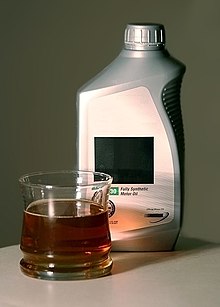
Back Syntetický olej Czech Synthetisches Öl German Aceite sintético Spanish روغن ترکیبی Persian Synteettinen öljy Finnish Huile de synthèse French Petrolio sintetico Italian Синтездик майлар Kirghiz Sintetinė alyva Lithuanian Minyak buatan Malay

Synthetic oil is a lubricant consisting of chemical compounds that are artificially modified or synthesised. Synthetic lubricants can be manufactured using chemically modified petroleum components rather than whole crude oil, but can also be synthesized from other raw materials. The base material, however, is still overwhelmingly crude oil that is distilled and then modified physically and chemically. The actual synthesis process and composition of additives is generally a commercial trade secret and will vary among producers.[1]
Synthetic oil is used as a substitute for petroleum-refined oils when operating in extreme temperature.[2] Aircraft jet engines, for example, require the use of synthetic oils, whereas aircraft piston engines do not.[3] Synthetic oils are also used in metal stamping to provide environmental and other benefits when compared to conventional petroleum and animal-fat based products.[4] These products are also referred to as "non-oil" or "oil free".
A polyalcanoate synthetic oil is widely used to lubricate pendulum clocks.
- ^ "How Synthetic Oil is Made". napaonline.com. 2016-11-28.
- ^ Machinery Lubrication. "Conventional vs Synthetic Oil". Archived from the original on 2010-04-06. Retrieved 2017-03-24.
- ^ "Synthetic oil: Is it right for your plane?". General Aviation News. 2005-03-11. Retrieved 2017-03-24.
- ^ "Metal Stamping FAQs". Keats Manufacturing Co. Retrieved 2017-03-24.
© MMXXIII Rich X Search. We shall prevail. All rights reserved. Rich X Search